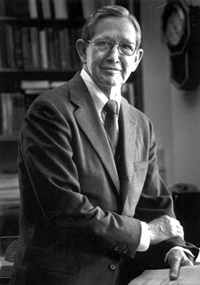History
Named in honor of Dr. Guy T. McBride – an educator, engineer, civic leader and Mines’ 12th president – the undergraduate honors program is one of the oldest and most innovative Honors programs in the country, with an outstanding record of preparing exceptional students to succeed in a globalized world.
Highly dedicated faculty established the program in 1978 as a service to the Mines community. Supported by a prestigious grant from the National Endowment for the Humanities, these pioneering faculty sought to transform engineering education by focusing on the full complexity of the human condition, as explored through the liberal arts.
They understood that for scientists and engineers to be truly effective – for Mines graduates to have a discernable impact on business and government, to be leaders and innovators – they need to be broadly educated. Graduates must be able to think outside the box, they must understand politics, economics, and culture, and they must to be able to communicate effectively.
Advocating a broad-ranging education for high achieving Mines students, President Guy T. McBride was an unseen hand behind the creation of the program in 1978. “He recognized,” as Dr. Dendy Sloan observed, “that leading a good life required connecting with a broader context than technical engineering and science could provide. It meant addressing larger human problems, ones that were not answered in the back of the book, such as the questions encountered in classic literature and the liberal arts.”
McBride’s vision has been shared by one Mines president after another. Under the current president, Dr. Paul Johnson, the school significantly enhanced its commitment to the program. In 2016, Mines embarked on an ambitious expansion of the program to be phased in over the ensuing years. Most notably, the Mines launched the First Year Honors Experience, a foundational program to enhance the educational experience and develop more opportunities for success for students at the start of their college careers.
Over the years, the program has fostered a unique collaboration between the liberal arts and science and engineering. Many courses have – and continue to be – team-taught by faculty with different areas of expertise, but with a common dedication to student enrichment.
The curriculum and the program itself have evolved over time. What began as the “McBride Honors Program in Public Affairs for Engineers,” later became the “McBride Honors Program in Public Affairs” or, more simply, the “McBride Honors Program.” At times the program put more weight on the interface between science, technology, and society; at other times, it emphasized the connection between science and policy. But from its inception, the program has consistently focused on the human condition, as explored through such topics as literature, ethics, cultural anthropology, international studies, and public policy.
McBride graduates have gone on to conduct path-breaking research, to start their own businesses, to live and work abroad, to pursue careers in law, medicine, and public policy, and to assume leadership roles in industry and engineering.

“President McBride recognized that leading a good life required connecting with a broader context than technical engineering and science could provide. It meant addressing larger human problems, ones that were not answered in the back of the book.”

Taken in 1973, Mines Students are seen visiting with President Dr. Guy T. McBride, who is standing in the doorway. He turns on “walk lights” as an invitation to students to come visit. Credit: Denver Post (Denver Post via Getty Images)